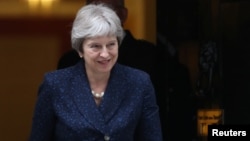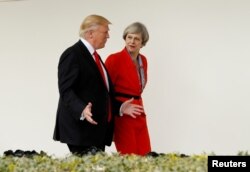British Prime Minister Theresa May won the support of senior ministers and an endorsement from Europe's most powerful leader, Angela Merkel, on Tuesday, surviving the explosive resignations of two top cabinet members
in protest at her Brexit plans.
May's government was rattled Monday by the departures of Foreign Minister Boris Johnson — the face of Brexit for many — and her chief Brexit negotiator, David Davis. Both fiercely criticized her negotiating stance.
Speaking alongside the German chancellor at a news conference in London, May rejected the charge that she had caved in to pressure from Brussels to keep strong ties with the bloc.
"[It] absolutely keeps faith with the vote of the British people," she said after a meeting with fellow European leaders focused on the Western Balkan states. "We will do this in a way which will be a smooth and orderly Brexit."
Earlier she said she had chaired a "productive" meeting of her reshaped cabinet ahead of the publication later this week of a full policy document on Brexit.
Merkel, a key voice in Brussels, said the other 27 EU members would give a joint response, "but it's good that the proposals are on the table — that much I can say already, without going into details."
Although May looked to have avoided a direct challenge to her leadership, there were more signs that all was not well.
U.S. President Donald Trump acknowledged that his scheduled visit to Britain was coming at a time of "turmoil" — comments May later brushed aside — and two more junior ministers quit in protest, with reports that more were ready to go.
'One voice'
Among those rallying around May was Environment Minister Michael Gove — a prominent campaigner to exit the European Union before the 2016 referendum — who said he would not resign.
With less than nine months left until Britain is due to leave the bloc, May is sticking to her plan for a "business friendly" Brexit, facing down hard-line Brexit supporters in her Conservative Party who are livid over her plans to negotiate a "free-trade area for goods" with the EU.
Above a picture of her cabinet, including her new foreign secretary, Jeremy Hunt, and Brexit minister Dominic Raab, May tweeted: "Productive Cabinet meeting this morning — looking ahead to a busy week."
"I think it is right that the cabinet backs the prime minister and speaks with one voice — and if people don't do that, then they have to go," Justice Secretary David Gauke told BBC radio.
May must now quickly seek EU support for her proposal. Talks have all but stalled because of her reluctance to show her cards until now for fear of angering one of the two main factions of her party.
But the furor has gained the attention of her allies.
Trump, answering a reporter's question about whether May would stay in power, said: "That's up to the people. I get along with her very well, I have a very good relationship."
In response, May said she was looking forward to meeting Trump when he arrives Thursday: "We'll be talking positively about how we can continue to work together in our special relationship."
Some Conservative Brexit supporters are still incensed over what they see as her breach of a promise to break cleanly from the EU.
'Ultimate betrayal'
"It is the ultimate betrayal of our democracy and people's belief in it. It's not even an accidental betrayal, it was planned and plotted well in advance," said Conservative lawmaker Andrew Bridgen.
"Never have so many campaigned for so long and so hard for so little," he told Reuters.
It is unlikely that Brexit campaigners have the numbers to win a vote of confidence against May, triggering a leadership contest. They also lack the support in parliament to try to change any deal that is agreed with the EU.
May's proposals for a future EU relationship after Britain departs from the bloc next March were two years in the making. But within 48 hours of their publication, Davis had quit, saying May had already given too much away to
the EU, and Johnson followed.
"Brexit should be about opportunity and hope," Johnson said in a scathing resignation letter. "That dream is dying, suffocated by needless self-doubt." He said Britain was heading for a "semi-Brexit."
The Sun, Britain's top-selling newspaper, which has long argued for Brexit, said May had made "blunder after blunder."
But others said May had adopted the most realistic plan after losing her parliamentary majority in an ill-judged election last year, leaving her reliant on a small Northern Irish party to govern.
"If people don't like this proposal, what is their alternative?" Gauke asked.






